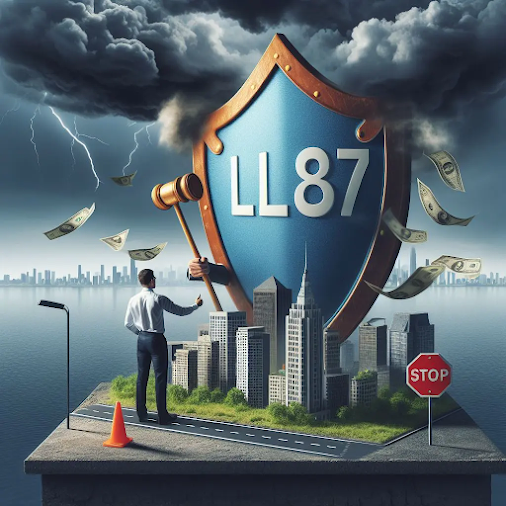views
Why You Can't Ignore Local Law 87 If You Own a Large Building in NYC
Introduction
In the heart of the bustling metropolis of New York City, where the skyline is punctuated by towering buildings, a crucial piece of legislation is shaping the future of urban sustainability: Local Law 87 (LL87). As the owner of a large building in NYC, it is imperative to understand and comply with this law. Local Law 87 is not simply a regulatory hurdle but a cornerstone policy aimed at driving energy efficiency and reducing the environmental footprint of the city's sizeable infrastructure. This blog post will explore the ins and outs of LL87 and underscore why it is an essential aspect of responsible building management in NYC.
What is Local Law 87?
Local Law 87, part of the overarching Greener, Greater Buildings Plan exemplifies New York City's commitment to combating climate change and promoting energy conservation. Enacted in 2009, the law requires buildings larger than 50,000 square feet to undergo periodic energy audits and retro-commissioning. It was implemented as a response to the pressing need for energy conservation in a city where buildings account for a significant portion of energy usage and carbon emissions. As an integral piece of the GGBP, LL87 helps the city reach its ambitious sustainability targets, making it a crucial part of NYC's environmental agenda.
Who Needs to Comply with Local Law 87?
LL87 targets a specific group: owners of NYC buildings that exceed 50,000 gross square feet. This includes residential, commercial, institutional, and mixed-use properties. The law recognizes that large buildings are major energy consumers and, therefore, have the potential to significantly impact the city’s overall energy consumption and environmental health. By focusing on these structures, LL87 aims for a high-impact approach to reducing citywide carbon emissions and promoting sustainable building practices.
Requirement of the Law
The key requirement of Local Law 87 is the submission of an Energy Efficiency Report (EER) every ten years, which includes documentation from completed energy audits and retro-commissioning efforts. An energy audit provides a detailed overview of a building’s energy flows and pinpoints areas where efficiencies can be gained. Following the audit, retro-commissioning—a systematic process to improve an existing building's performance—ensures that building systems are operating as intended. By complying with these steps, building owners not only adhere to NYC building regulations but also pave the way for smarter and more cost-effective energy consumption.
The Importance of Energy Efficiency and Sustainability
The urgency to adopt sustainable building practices has never been more pronounced. Local Law 87 fosters this by mandating actions that enhance building performance and contribute to a more sustainable urban environment. For building owners, the importance transcends legal compliance; it's about being part of a collective movement towards sustainability. Energy efficiency not only decreases utility costs but also minimizes the environmental impact by reducing greenhouse gas emissions. This is significant in a city like New York, which is at the forefront of global conversations about urban sustainability and climate change mitigation efforts.
Penalties for Non-Compliance
Overlooking the mandates of LL87 can lead to hefty fines. The penalties for non-compliance can reach thousands of dollars per year, rapidly accumulating and posing a substantial financial burden. Additionally, non-compliant buildings may face operational roadblocks, such as difficulties in obtaining work permits for renovations or alterations. NYC's Department of Buildings enforces these regulations stringently, emphasizing the importance of timely compliance.

Benefits of Local Law 87 Compliance
Compliance with LL87 goes beyond avoiding legal repercussions; it offers tangible benefits. Environmentally, adherence plays a part in decreasing the collective carbon footprint of NYC's buildings. Economically, the implementation of energy efficiency measures often results in reduced energy costs, thereby lowering a building's operating expenses. These savings can be substantial, offsetting the initial investment in compliance measures. Additionally, buildings that meet energy efficiency standards may experience an increase in property and resale value, making LL87 compliance a financially sound decision in the long run.
How to Comply with Local Law 87
The journey to compliance is multistep but straightforward. Building owners should start by hiring a qualified energy auditor, whose credentials can be checked through the Building Performance Lab’s list of approved providers or by consulting the Consortium for Energy Efficiency. The energy audit will yield a list of recommendations, which should then be addressed through retro-commissioning. The final step involves compiling and submitting the EER to the NYC Department of Buildings. The New York City Energy Conservation Code offers guidance for meeting the standards set out by LL87.
Conclusion
Comprehensively, Local Law 87 exemplifies a proactive approach to urban sustainability, pushing large building owners in NYC to optimize energy use and contribute to a greener city. By understanding and adhering to LL87, building owners not only meet legal requirements but also join the ranks of those leading the charge in energy-conscious management. In doing so, they reap the benefits of cost savings, contribute to a healthier environment, and affirm their commitment to the long-term vision of a resilient and sustainable New York City.
VertPro serves as a resourceful platform for property owners and managers seeking to enhance their buildings' energy efficiency. The site offers a range of services, including Commercial Energy Audits, Benchmark Compliance consultancy, and a Construction Marketplace. At the heart of VertPro® is a suite of SaaS technology-based solutions designed to assist in navigating the complexities of Energy Benchmarking and Energy Audits/RCx Plus, while ensuring adherence to over 60 Energy Benchmarking and Energy Efficiency Laws across the country.
For those looking to improve their property's energy usage and operational value, VertPro.com provides a diverse array of tools and information. The site aims to facilitate a better understanding of energy efficiency practices and legislation, helping building owners and property managers make informed decisions about their energy strategies while complying with all energy ordinances and laws.






















Comments
0 comment